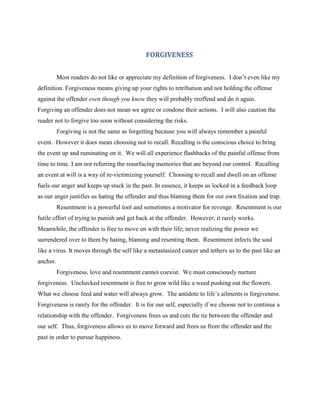
Forgiveness
- 1. FORGIVENESS Most readers do not like or appreciate my definition of forgiveness. I don’t even like my definition. Forgiveness means giving up your rights to retribution and not holding the offense against the offender even though you know they will probably reoffend and do it again. Forgiving an offender does not mean we agree or condone their actions. I will also caution the reader not to forgive too soon without considering the risks. Forgiving is not the same as forgetting because you will always remember a painful event. However it does mean choosing not to recall. Recalling is the conscious choice to bring the event up and ruminating on it. We will all experience flashbacks of the painful offense from time to time. I am not referring the resurfacing memories that are beyond our control. Recalling an event at will is a way of re-victimizing yourself. Choosing to recall and dwell on an offense fuels our anger and keeps up stuck in the past. In essence, it keeps us locked in a feedback loop as our anger justifies us hating the offender and thus blaming them for our own fixation and trap. Resentment is a powerful tool and sometimes a motivator for revenge. Resentment is our futile effort of trying to punish and get back at the offender. However, it rarely works. Meanwhile, the offender is free to move on with their life; never realizing the power we surrendered over to them by hating, blaming and resenting them. Resentment infects the soul like a virus. It moves through the self like a metastasized cancer and tethers us to the past like an anchor. Forgiveness, love and resentment cannot coexist. We must consciously nurture forgiveness. Unchecked resentment is free to grow wild like a weed pushing out the flowers. What we choose feed and water will always grow. The antidote to life’s ailments is forgiveness. Forgiveness is rarely for the offender. It is for our self, especially if we choose not to continue a relationship with the offender. Forgiveness frees us and cuts the tie between the offender and our self. Thus, forgiveness allows us to move forward and frees us from the offender and the past in order to pursue happiness.
- 2. 10 Steps of Forgiveness 1) Acknowledge the hurt and pain cause by the offense. 2) Recognize which of your values were violated. 3) Consider how the offense will affect you in the long term, mid-term and short-term. 4) Distinguish the person from the offense and recognize the person is responsible but not defined by the offense. 5) Choose not to re-victimize yourself by not recalling and dwelling on the event. 6) Acknowledge your limitations and that you have no control over the person. 7) Give up your rights to retribution and revenge. 8) If you plan to continue the relationship with the person, define your future expectations and consequences. 9) Recognize what you are grateful for. 10) Repeat the above process daily as needed.
